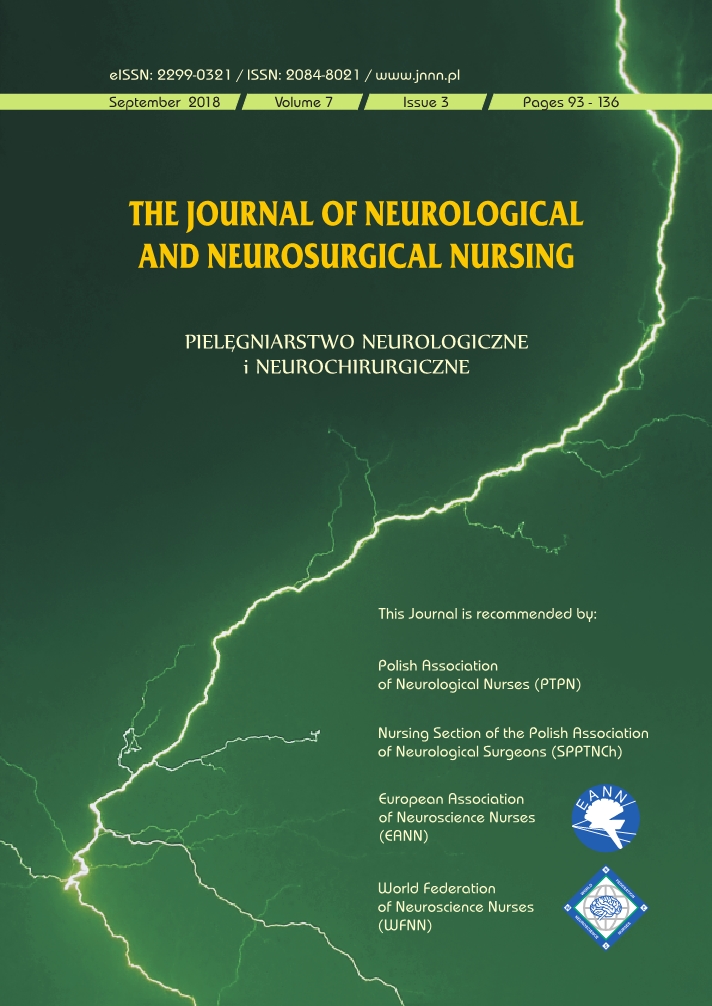Ocena czynności życia codziennego u pacjentów po operacji guza mózgu
DOI:
https://doi.org/10.15225/PNN.2018.7.3.3Słowa kluczowe
guz mózgu, wyniki, ocena funkcjonalnaAbstrakt
Wstęp. Sprawność czynnościowa (funkcjonalna) umożliwia zaspokajanie i wykonywanie podstawowych potrzeb dnia codziennego w sposób bezpieczny, samodzielny. Jej ocena stanowi w chwili obecnej podstawowy komponent całościowej oceny pacjenta.
Cel. Celem pracy była ocena wydolności czynnościowej pacjentów po operacji guza mózgu. Analizie poddano wybrane czynniki mogące mieć wpływ na wydolność czynnościową pacjenta po zabiegu operacyjnym.
Materiał i metody. W badaniu uczestniczyło 165 pacjentów oddziałów neurochirurgii hospitalizowanych z powodu guza mózgu. U wszystkich został wykonany zabieg operacyjny — polegający na częściowym lub doszczętnym usunięciu masy patologicznej drogą kraniotomii. Analizie poddano ocenę czynnościową pacjenta w dniu przyjęcia oraz w dniu wypisu za pomocą skali FCS, KPS, BI, FIR, GOS.
Wyniki. Najwięcej badanych w dniu przyjęcia, to pacjenci będący w I grupie według skali FCS — niezależni — 138 osób (83,6%). Żaden pacjent nie został zakwalifikowany do grupy IV o całkowitej zależności. Z kolei w dniu wypisu odsetek respondentów zakwalifikowanych do grupy I wyniósł 127 osób (77,0%), natomiast jedna osoba stała się całkowicie zależna. Podobne wyniki zostały uzyskane w pozostałych narzędziach pomiarowych. Zaobserwowane różnice w każdym z przeprowadzonych testów nie okazały się istotne statystycznie. W skali KPS, BI oraz GOS wiek okazał się istotny statystycznie na poziomie p=0,000. Z kolei w skali FCS, KPS oraz GOS stan przytomności także okazał się istotny statystycznie na poziomie p=0,000.
Wnioski. Większość badanych zarówno w dniu przyjęcia, jak i w dniu wypisu wykazuje bardzo dobrą wydolność funkcjonalną. Jednak nieznacznie lepszą ocenę czynnościową uzyskali pacjenci w dniu przyjęcia na oddział. Czynniki takie jak wiek oraz przytomność przed zabiegiem operacyjnym istotnie wpływają na wydolność funkcjonalną chorego w dniu wypisu. (PNN 2018;7(3):111–117)
Bibliografia
Wiktor K., Drozdzowska B., Czekajło A., Hebel R. Wybrane metody oceny czynnościowej (funkcjonalnej) w praktyce lekarskiej. Ann Acad Med Siles. 2010;64(5–6):76–81.
Osiński W. Gerokinezjologia. Nauka i praktyka aktywności fizycznej w wieku starszym. Wydawnictwo Lekarskie PZWL, Warszawa 2013.
McCarty S., Eickmeyer S.M., Kocherginsky M. et al. Health-Related Quality of Life and Cancer-Related Symptoms During Interdisciplinary Outpatient Rehabilitation for Malignant Brain Tumor. Am J Phys Med Rehabil. 2017;96(12):852–860.
Fu J.B., Morishita S., Yadav R. Changing Paradigms in the Rehabilitation of Inpatients with Brain Tumors. Curr Phys Med Rehabil Rep. 2018;6(2):115–120.
Fox M.E., King T.Z. Functional Connectivity in Adult Brain Tumor Patients: A Systematic Review. Brain Connect. 2018;8(7):381–397.
Hadjiabadi D.H., Pung L., Zhang J. et al. Brain tumors disrupt the resting-state connectome. Neuroimage Clin. 2018;18:279–289.
Drużbicki M., Pacześniak-Jost A., Kwolek A. Metody klinimetryczne stosowane w rehabilitacji neurologicznej. Prz Med Uniw Rzesz. 2007;3:268–274.
Pasek J., Pasek T., Ładziński P., Sieroń A. Rehabilitacja szpitalna u pacjentów po operacji guza mózgu. Ann Acad Med Siles. 2013;67(2):142–149.
Ślusarz R. Functional Capacity Scale (FCS) in Nursing Practice. J Neurol Neurosurg Nurs. 2012;1(1):35–40.
Ślusarz R., Beuth W., Książkiewicz B. Postsurgical examination of functional outcome of patients having undergone surgical treatment of intracranial aneurysm. Scand J Caring Sci. 2009;23(1):130–139.
Mor V., Laliberte L., Morris J.N., Wiemann M. The Karnofsky Performance Status Scale. An examination of its reliability and validity in a research setting. Cancer. 1984;53(9):2002–2007.
Schag C.C., Heinrich R.L., Ganz P.A. Karnofsky performance status revisited: reliability, validity, and guidelines. J Clin Oncol. 1984;2(3):187–193.
Jennett B., Bond M. Assessment of outcome after severe brain damage. Lancet. 1975;1(7905):480–484.
Mahoney F.I., Barthel D.W. Functional evaluation: The Barthel Index. Md State Med J. 1965;14:61–65.
Kostka T., Koziarska-Rościszewska M. Choroby wieku podeszłego. Wydawnictwo Lekarskie PZWL, Warszawa 2009.
Opara J. Analiza przydatności wybranych skal udarów do oceny wyników rehabilitacji chorych z niedowładem połowiczym. Rozprawa habilitacyjna, Katowice 1996.
Teasdale G., Jennett B. Assessment of coma and impaired consciousness. A practical scale. Lancet. 1974;2(7872):81–84.
De Castro Mariano J., Reuben D.B. Functional Assessment. In Hirth V., Wieland D., Dever-Bumba M. (Ed.), Case-based Geriatrics: A Global Approach. McGraw-Hill Medical, New York 2011.
Ferroli P., Broggi M., Schiavolin S. et al. Predicting functional impairment in brain tumor surgery: the Big Five and the Milan Complexity Scale. Neurosurg Focus. 2015;39(6):E14.
Lorencowicz R., Jasik J., Czerwińska N., Turowski K., Przychodzka E. Wpływ leczenia neurochirurgicznego na wydolność funkcjonalną. W: Kulik T.B., Król H. (Red.), Zdrowie i dobrostan. Wydawnictwo Naukowe NeuroCentrum, Lublin 2014.
Gosal J.S., Behari S., Joseph J. et al. Surgical excision of large-to-giant petroclival meningiomas focusing on the middle fossa approaches: The lessons learnt. Neurol India. 2018;66(5):1434–1446.
Skeie B.S., Eide G.E., Flatebø M. et al. Quality of life is maintained using Gamma Knife radiosurgery: a prospective study of a brain metastases patient cohort. J Neurosurg. 2017;126(3):708–725.
Mwita C.C., Koech F., Sisenda T., Patel K., Macharia B., Rahangdale D. Clinicopathologic Features and Early Surgical Outcome of Astrocytomas in Eldoret, Kenya. J Neurosci Rural Pract. 2018;9(3):363–369.
Stienen M.N., Zhang D.Y., Broggi M. et al. The influence of preoperative dependency on mortality, functional recovery and complications after microsurgical resection of intracranial tumors. J Neurooncol. 2018;139(2):441–448.
Kos N., Kos B., Benedicic M. Early medical rehabilitation after neurosurgical treatment of malignant brain tumours in Slovenia. Radiol Oncol. 2016;50(2):139–144.
Pobrania
Opublikowane
Jak cytować
Numer
Dział
Licencja

Utwór dostępny jest na licencji Creative Commons Uznanie autorstwa – Bez utworów zależnych 4.0 Międzynarodowe.
Statystyki
Liczba wyświetleń i pobrań: 324
Liczba cytowań: 0
